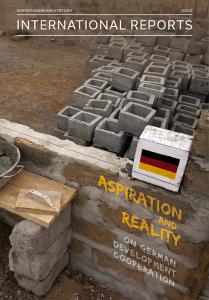Issue: 3/2023
This discussion is not new: for a long time, there has been keen debate among politicians and experts about whether the large sums of money that industrialised countries have been investing in the economic development of countries in Latin America, Africa and Asia, especially since the 1960s, have brought about significant progress, or in fact may have financed corrupt elites instead, thereby stabilising the latter. The debate has always been an important one: after all, development cooperation will only enjoy lasting legitimacy in society if, in addition to celebrating its accomplishments, its failures and misguided priorities are also clearly identified and subsequently corrected. This issue of International Reports seeks to make a critical and constructive contribution to this debate.
Looking at the articles included in this issue, alongside the positive developments, a number of different – and to some extent interrelated – problems and challenges of current German development policy do indeed emerge, which we need to address and from which we need to draw the appropriate conclusions, some of which are mentioned here.
The focus should be on concrete action – not on talking about it. “Do good things and talk about it” is an age-old wisdom that, to some extent, applies to development cooperation as well. For example, when the EU and its member states spend significantly more money on development cooperation in many regions than China does, but the local population has a much greater awareness of Chinese projects, there is indeed something wrong with the communication. But if more and more energy is spent on labelling development policy measures in such a way that they attract the goodwill of a narrowly defined electoral clientele back home, we are on the wrong track too. The most striking example of this is the “feminist development policy” proclaimed at the beginning of 2023. Targeted support for women has been an integral part of German development policy for quite some time: it is sensible and necessary for obvious reasons. It is doubtful, however, whether the high-profile promotion of these measures as “feminist” will result in additional benefits to the addressees in the future. As -Stefan Friedrich and Mathias Kamp write in their article on development cooperation with African countries, this kind of communication is by no means met with approval everywhere; indeed, it can even feed accusations of paternalism in some places. Well meant is not always well done.
Actual results should be the yardstick, not good intentions. It is good and right for us to set about shaping policy – including development policy – with certain values and ideals in mind. In the end, however, this policy must be measured by the actual results it achieves. Here, for example, it is instructive to look at our energy cooperation with African states, which Anja Berretta analyses in more detail in her article. Of course we can advocate the need for climate protection and stop promoting bridging energy sources such as natural gas in Africa, focusing solely on the promotion of “green” energies – as Germany often does nowadays under the slogan of the “just energy transition”. Yet in a world in which the Western states are not the only relevant actors, this can lead to the African countries concerned pursuing their gas projects with Turkish, Russian or Chinese partners instead, and we lose out on three counts: no orders for German companies, dwindling influence in these countries and, due to the use of poorer technology, more greenhouse gas emissions into the Earth’s atmosphere.
Rather than abstractly invoking a “partnership of equals”, we should be even more consistent in our efforts to cultivate respectful relations with our partners in practice. Hardly any concept in development cooperation sounds so desirable at first glance yet at the same time is so worn out as that of a “partnership of equals”. Let us be honest: equality in a relationship – be it military, economic or of any other kind – is not a condition that can be established by one of the two parties by rhetoric, but an expression of actual (approximate) equality. As such, it is neither dependent on our goodwill, nor is it necessarily in our best interests in every instance. Our goal must be a relationship based on mutual respect with our partners in development cooperation. We have undoubtedly made progress along this path in the past few decades. But we can and must improve (again) in the three aspects that this kind of relationship involves.
Firstly: Respecting our partners means understanding them as acting subjects. The fact that all action takes place within certain structures should be as undisputed as the fact that, for example in the case of most African states, structures created during the colonial era still have an impact today, at least to some extent. However, we must avoid feeding a narrative in which these countries appear only as passive victims of adverse circumstances for which the Western states are to blame and which only the Western states can change: this would not only be a grotesque overestimation of ourselves, it would also unduly relieve the local elites in our partner states of their own responsibility.
Secondly: In a respectful relationship, it is not only acceptable but desirable for us to openly communicate our own interests and constraints on action. Aid based on a sense of humanity can certainly play a role in development policy, but no one would believe that this is always our sole motive. So let us be open about our interests in development cooperation – from economic benefits and climate protection to political stability and the reduction of unmanaged migration. This increases acceptance “back home” and enhances our credibility with partners. Take the case of Jordan, which Edmund Ratka examines in more detail in this issue: this example shows that development policy can and may take geostrategic considerations into account as well.
Thirdly: Respecting our partners means taking their interests seriously – and not just when they happen to suit us. Here, too, a look at our energy cooperation with African states is revealing. Obviously, the group of traditional industrialised countries will not be able to stop global warming on their own. Nonetheless, the main concern of many countries is first and foremost energy security. If we exclusively support the use of renewable energies in other countries while allowing ourselves to use more coal in times of energy scarcity, our partners rightly gain the impression that our energy security matters while theirs does not.
Economic considerations must not be pushed into the background. Development cooperation today is about much more than supporting economic progress in individual “recipient states”. It covers a wide range of areas, from cooperation on the rule of law, which Pavel Usvatov and Julia Leitz analyse in their article, to environmental protection and the development, production and distribution of vaccines. And rightly so: after all, global challenges such as climate change and pandemics require efforts in the area of development policy, too. Nevertheless, economic development and poverty reduction remain the most pressing concerns for many partner countries. And this is only too understandable given the persistent deficits in these areas. These concerns must also be reflected in the priorities set out for German development cooperation. The private sector and trade have a crucial role to play here. So while it is welcome that Germany is strongly promoting the implementation of the African Free Trade Area, for example, it is regrettable to see that, if anything, things have taken a step backwards in terms of the involvement of German companies in our development policy. When economic improvements in our partner countries also benefit -German companies, none of these countries perceives that as a problem – and neither should Germany.
Focus on the essentials: perhaps this is the most apt common denominator of the points set out here. And that approach is all the more urgent in times of tight budgets. But not only that: the international setting and domestic political developments in a number of partner states likewise suggest that a certain modesty might be advisable. There are numerous goals and values that we consider to be right and that we would also like to achieve in our partner countries through the vehicle of our development cooperation. But we should also recognise that the number of those who share these goals in the world has not increased in recent times. Just think of the Sahel, where one country after another has become the scene of military coups in recent years. Should we completely withdraw our development cooperation from countries that go against our preferences in terms of form of government and socio-political orientation? Can and should we continue cooperation, completely bypassing the respective government if necessary? We need to find nuanced answers to such questions, based on sober debate. The yardstick must be our interests and the likely developmental consequences of our decisions – not just how we feel about them.
I hope you will find this report a stimulating read.
Yours,

Dr. Gerhard Wahlers is Editor of International Reports, Deputy Secretary General and Head of the Department European and International Cooperation of the Konrad-Adenauer-Stiftung (gerhard.wahlers@kas.de).





